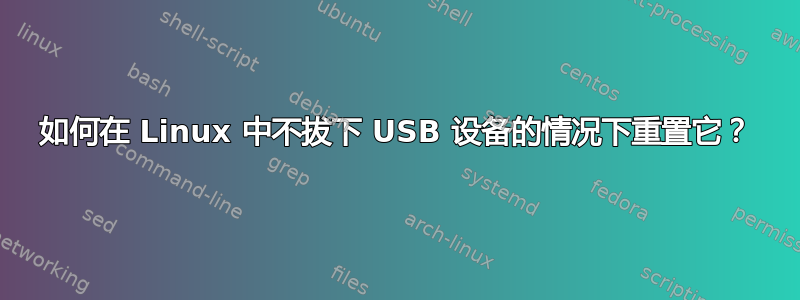
有时可能需要重置 USB 设备,有没有办法在软件中执行重置,而无需拔下设备本身然后再重新插入?
更具体地说,我有一个网络摄像头,当过多调整设置时它会变得混乱guvcapture,然后需要重置才能回到正轨。
答案1
還有包括usbreset。
运行它而不使用任何参数,以查看使用情况和设备列表。它需要超级用户权限才能实际重置设备。
Usage:
usbreset PPPP:VVVV - reset by product and vendor id
usbreset BBB/DDD - reset by bus and device number
usbreset "Product" - reset by product name
这允许重置单个设备,这比重置整个总线的一些解决方案有所改进。它可能无法解决中间集线器/总线问题,但仅重置所需设备的干扰要小得多。
答案2
假设我想重置/dev/sdc。
# udevadm info -q all /dev/sdc | grep DEVPATH
E: DEVPATH=/devices/pci0000:00/0000:00:14.0/usb2/2-1/2-1.4/2-1.4:1.0/host2/target2:0:0/2:0:0:0/block/sdc
我采取2-1.4上述操作(您的设备可能也是如此2-1- 我的设备已插入集线器)并执行以下操作:
# echo 2-1.4 > /sys/bus/usb/drivers/usb/unbind
# echo 2-1.4 > /sys/bus/usb/drivers/usb/bind
答案3
你可以尝试本杰明·克洛斯的resetusb计划重置所有设备 — 没有可用的二进制文件,但编译起来相当容易。将源代码另存为resetusb.c,然后运行:
gcc -lusb resetusb.c -o resetusb
您现在可以作为 运行该工具resetusb。或者,@unhammer 指向Alan Stern 的单设备版本(加上一些使用方法提示)。
有些人也很幸运只需删除并modprobe添加相关模块:
modprobe -vr ehci_hcd
modprobe -v ehci_hcd
(当然你可以编写脚本)
一些发行版可能也有自己的工具来重新启动 USB 子系统;曼德拉草显然/etc/init.d/usb。
答案4
我创建了一个 Python 脚本来简化整个过程:
将以下脚本保存为 reset_usb.py 或者克隆这个仓库。
用法:
python reset_usb.py help # Show this help
sudo python reset_usb.py list # List all USB devices
sudo python reset_usb.py path /dev/bus/usb/XXX/YYY # Reset USB device using path /dev/bus/usb/XXX/YYY
sudo python reset_usb.py search "search terms" # Search for USB device using the search terms within the search string returned by list and reset matching device
sudo python reset_usb.py listpci # List all PCI USB devices
sudo python reset_usb.py pathpci /sys/bus/pci/drivers/.../XXXX:XX:XX.X # Reset PCI USB device using path /sys/bus/pci/drivers/.../XXXX:XX:XX.X
sudo python reset_usb.py searchpci "search terms" # Search for PCI USB device using the search terms within the search string returned by listpci and reset matching device
脚本:
#!/usr/bin/env python
import os
import sys
from subprocess import Popen, PIPE
import fcntl
instructions = '''
Usage: python reset_usb.py help : Show this help
sudo python reset_usb.py list : List all USB devices
sudo python reset_usb.py path /dev/bus/usb/XXX/YYY : Reset USB device using path /dev/bus/usb/XXX/YYY
sudo python reset_usb.py search "search terms" : Search for USB device using the search terms within the search string returned by list and reset matching device
sudo python reset_usb.py listpci : List all PCI USB devices
sudo python reset_usb.py pathpci /sys/bus/pci/drivers/.../XXXX:XX:XX.X : Reset PCI USB device using path
sudo python reset_usb.py searchpci "search terms" : Search for PCI USB device using the search terms within the search string returned by listpci and reset matching device
'''
if len(sys.argv) < 2:
print(instructions)
sys.exit(0)
option = sys.argv[1].lower()
if 'help' in option:
print(instructions)
sys.exit(0)
def create_pci_list():
pci_usb_list = list()
try:
lspci_out = Popen('lspci -Dvmm', shell=True, bufsize=64, stdin=PIPE, stdout=PIPE, close_fds=True).stdout.read().strip().decode('utf-8')
pci_devices = lspci_out.split('%s%s' % (os.linesep, os.linesep))
for pci_device in pci_devices:
device_dict = dict()
categories = pci_device.split(os.linesep)
for category in categories:
key, value = category.split('\t')
device_dict[key[:-1]] = value.strip()
if 'USB' not in device_dict['Class']:
continue
for root, dirs, files in os.walk('/sys/bus/pci/drivers/'):
slot = device_dict['Slot']
if slot in dirs:
device_dict['path'] = os.path.join(root, slot)
break
pci_usb_list.append(device_dict)
except Exception as ex:
print('Failed to list pci devices! Error: %s' % ex)
sys.exit(-1)
return pci_usb_list
def create_usb_list():
device_list = list()
try:
lsusb_out = Popen('lsusb -v', shell=True, bufsize=64, stdin=PIPE, stdout=PIPE, close_fds=True).stdout.read().strip().decode('utf-8')
usb_devices = lsusb_out.split('%s%s' % (os.linesep, os.linesep))
for device_categories in usb_devices:
if not device_categories:
continue
categories = device_categories.split(os.linesep)
device_stuff = categories[0].strip().split()
bus = device_stuff[1]
device = device_stuff[3][:-1]
device_dict = {'bus': bus, 'device': device}
device_info = ' '.join(device_stuff[6:])
device_dict['description'] = device_info
for category in categories:
if not category:
continue
categoryinfo = category.strip().split()
if categoryinfo[0] == 'iManufacturer':
manufacturer_info = ' '.join(categoryinfo[2:])
device_dict['manufacturer'] = manufacturer_info
if categoryinfo[0] == 'iProduct':
device_info = ' '.join(categoryinfo[2:])
device_dict['device'] = device_info
path = '/dev/bus/usb/%s/%s' % (bus, device)
device_dict['path'] = path
device_list.append(device_dict)
except Exception as ex:
print('Failed to list usb devices! Error: %s' % ex)
sys.exit(-1)
return device_list
if 'listpci' in option:
pci_usb_list = create_pci_list()
for device in pci_usb_list:
print('path=%s' % device['path'])
print(' manufacturer=%s' % device['SVendor'])
print(' device=%s' % device['SDevice'])
print(' search string=%s %s' % (device['SVendor'], device['SDevice']))
sys.exit(0)
if 'list' in option:
usb_list = create_usb_list()
for device in usb_list:
print('path=%s' % device['path'])
print(' description=%s' % device['description'])
print(' manufacturer=%s' % device['manufacturer'])
print(' device=%s' % device['device'])
print(' search string=%s %s %s' % (device['description'], device['manufacturer'], device['device']))
sys.exit(0)
if len(sys.argv) < 3:
print(instructions)
sys.exit(0)
option2 = sys.argv[2]
print('Resetting device: %s' % option2)
# echo -n "0000:39:00.0" | tee /sys/bus/pci/drivers/xhci_hcd/unbind;echo -n "0000:39:00.0" | tee /sys/bus/pci/drivers/xhci_hcd/bind
def reset_pci_usb_device(dev_path):
folder, slot = os.path.split(dev_path)
try:
fp = open(os.path.join(folder, 'unbind'), 'wt')
fp.write(slot)
fp.close()
fp = open(os.path.join(folder, 'bind'), 'wt')
fp.write(slot)
fp.close()
print('Successfully reset %s' % dev_path)
sys.exit(0)
except Exception as ex:
print('Failed to reset device! Error: %s' % ex)
sys.exit(-1)
if 'pathpci' in option:
reset_pci_usb_device(option2)
if 'searchpci' in option:
pci_usb_list = create_pci_list()
for device in pci_usb_list:
text = '%s %s' % (device['SVendor'], device['SDevice'])
if option2 in text:
reset_pci_usb_device(device['path'])
print('Failed to find device!')
sys.exit(-1)
def reset_usb_device(dev_path):
USBDEVFS_RESET = 21780
try:
f = open(dev_path, 'w', os.O_WRONLY)
fcntl.ioctl(f, USBDEVFS_RESET, 0)
print('Successfully reset %s' % dev_path)
sys.exit(0)
except Exception as ex:
print('Failed to reset device! Error: %s' % ex)
sys.exit(-1)
if 'path' in option:
reset_usb_device(option2)
if 'search' in option:
usb_list = create_usb_list()
for device in usb_list:
text = '%s %s %s' % (device['description'], device['manufacturer'], device['device'])
if option2 in text:
reset_usb_device(device['path'])
print('Failed to find device!')
sys.exit(-1)


